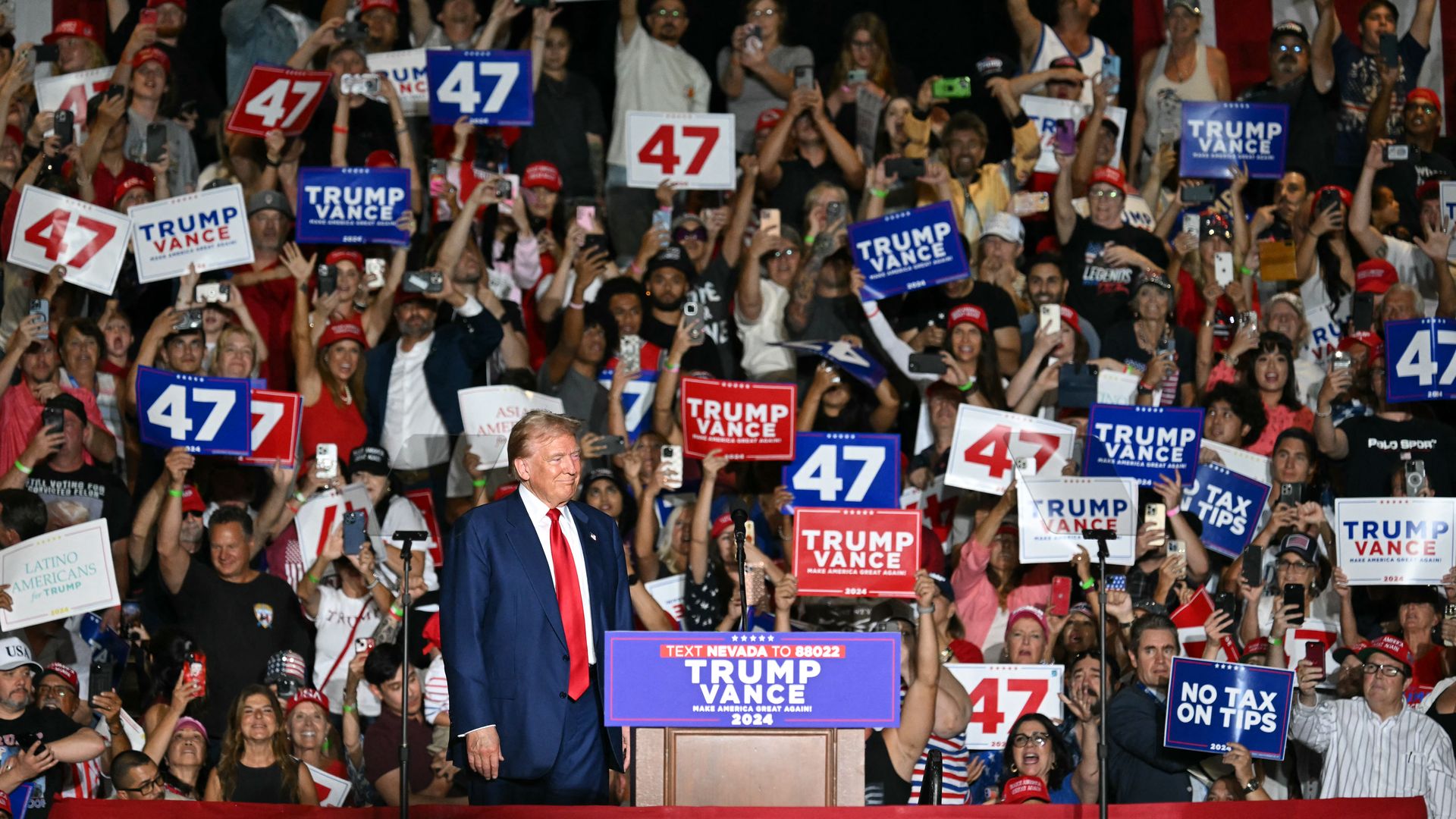Although the Republican party was dominant in Nevada in the late 1960s-80s, the population has nearly tripled since 1980, bringing in a new demographic of voters. George W. Bush and the Republican party won Nevada's vote in 2000 by just barely 5% over Democrat Al Gore. Similarly, in 2004, Nevada voted red, this time winning by only 2.6%. In both elections, all of Nevada's electoral votes went to the Republican party. However, things began to change when Nevada voted for Barack Obama in 2008 and continued its trend of voting blue to the 2020 election. In 2016, Hillary Clinton beat Donald Trump by a difference of 2%, and similarly in 2020, Joe Biden beat Trump by about 2.5%. Nevada is currently a swing state and is among 7 states that could decide the fate of the election.
Nevada has a notably large non-white population, with about 40% of the state’s eligible voters being Latino, Black, or Asian American Pacific Islanders. With these groups in mind, Harris draws a bit more support than Trump in Nevada. However, concerns about costs of living, inflation and immigration could give former president Trump a boost from these worried voters. According to a new poll released by Latino advocacy nonprofit, UnidosUS, Nevada Latinos significantly trust Democrats on issues such as the economy and health care over Republicans. However, rent prices are on the rise creating concerns about the economy. The wealthy have the money to purchase a house in today's economy (or build it) so working-class families are facing housing distress. This is why some Hispanic and Latino voters are deciding to vote for Trump, they believe that his economic views will help them in this time of need.
 |
| Harris rally in Nevada Aug. 10, 2024 |
The prices of single-family homes in Nevada are almost back to the record high set during the pandemic (about $480,000). Because of this, many lean towards Trump's policy, which says: "To help new home buyers, Republicans will reduce mortgage rates by slashing inflation, open limited portions of federal lands to allow for new home construction, promote home ownership through tax incentives and support for first-time buyers, and cut unnecessary regulations that raise housing costs". Harris has a different approach to the topic, stating that "as more new homes are built and affordable housing supply increases, Vice President Harris will provide first-time homebuyers with up to $25,000 to help with their down payments, with more generous support for first-generation homeowners. This will help more Americans experience the pride of homeownership and the financial security that it represents and brings — offering more Americans a path to the middle class and economic opportunity". While the idea is appealing, many question where the money will come from and why interest rates won't be brought down (a more impactful solution for all, not just first-generation homebuyers). As of September 19, each candidate has 48% of the vote with 2% of voters undecided or supporting another candidate.
Sources:
https://www.270towin.com/states/Nevada
https://www.britannica.com/event/United-States-presidential-election-of-2000
https://www.cnn.com/2024/09/17/politics/nevada-hispanic-voters-trump-harris/index.html
https://www.npr.org/2024/09/16/g-s1-22212/election-harris-trump-swing-states#nevada
https://thenevadaindependent.com/article/poll-nevada-latinos-backing-harris-but-margin-with-trump-closer-than-in-2020
https://unidosus.org/press-releases/unidosus-voter-poll-pocketbook-issues-still-top-nevada-latino-priorities/
https://images.axios.com/gcBioqYkR51SPvUHhNxMSHbbkxE=/0x826:7932x5288/1920x1080/2024/09/18/1726676117449.jpg
https://cdnph.upi.com/svc/sv/upi/8921723309392/2024/1/d67b6a07c6ddc92d2e70b3167db7c1f9/Harris-and-Walz-set-to-wrap-up-battleground-state-tour-in-Nevada.jpg
https://www.ktnv.com/news/looking-into-how-housing-policies-from-each-presidential-candidate-would-affect-southern-nevada

2 comments:
Both of these proposals on paper, sound too good to be true. And maybe that’s right. During election years, the current presidential administration wants to make itself look better to get reelected. But neither are actually addressing the root cause of these inflation issues. Harris is proposing a crackdown on corporate landlords which while relevant in a lot of people’s minds isn’t actually where the rise in housing prices comes from. Also her incentive Addison mentions is nice for a lucky few who get a $25,000 down payment but will terribly drive up houses for the majority of people. However, in Trump’s case, making new houses isn’t really an option. There are local and state regulations on where new houses can be built and even using federal land isn’t useful because most federal land isn’t where the demand for houses is. Neither campaign seems to take an approach that actually solves the problem but rather just appeals to what sounds interesting and votable for their campaign. While inflation rates have steadily decreased since 2020 from 7.0 percent to 2.5 percent this past month, this is more of a result of post pandemic return to “normal” than it is of the administrations in office specifically.
I like how this post breaks down Nevada’s whole political vibe—definitely captures why it’s such a toss-up state right now. It’s interesting to see how Nevada’s demographics have evolved, especially with so many Latino, Black, and AAPI voters now playing a big role. The post really digs into the different economic pressures that could push voters either way. Trump’s plan for affordable housing leans on cutting regulations and making it easier to build, while Harris is focused on giving direct support to first-time buyers. The UnidosUS poll adds a cool layer here—lots of Nevada’s Latino voters trust Democrats on issues like healthcare and the economy, but rising costs, inflation, and housing prices are tough to ignore, especially because the middle class is impacted by those the most. It makes sense that some are swinging toward Trump if they feel his approach to the economy will give them quicker and potentially more long term relief, rather than the super short-term stimulus checks given out by democrats.
Post a Comment